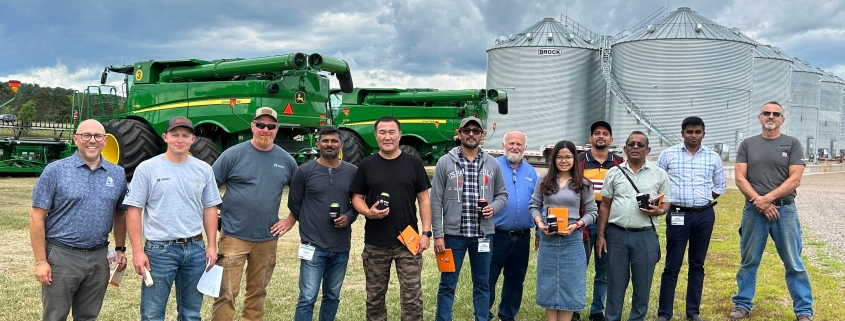Building relationships – from ‘Fork to Farm’
The term “fork to farm” still might sound backwards to some, but for the Specialty Soya and Grains Alliance (SSGA) and its members who supply food-grade soybeans, including those labeled with the U.S. Identity Preserved mark, it’s all forward thinking.
On Saturday, Aug. 12, SSGA brought the fork to the farm with its second Fork to Farm Day of the summer, this time hosting an Asian trade team in west-central Wisconsin, a hotbed of food-grade, identity preserved soybeans. The Wisconsin Soybean Marketing Board (WSMB) sponsored the event.
“A lot of varieties can grow in Wisconsin,” said Scott Sinner, partner with SSGA-member SB&B Foods, a North Dakota-based company with a facility in Bloomer, Wis. “They ship out of Minneapolis, and farmers here have the same attitude: They know what’s needed for a safe, reliable crop.”
The trade team came to the U.S. via the World Initiative for Soy in Human Health (WISHH) and included visitors from Sri Lanka, Cambodia, Kazakhstan and Myanmar. The group, which over the previous five days participated in Northern Crops Institute’s INTSOY course, traveling around North Dakota, South Dakota and Minnesota, added the Fork to Farm event to its travel itinerary, first stopping at SB&B where it heard presentations and remarks from Sinner and representatives of SSGA, WSMB and the Wisconsin Department of Agriculture, Trade and Consumer Protection (DATCP).
“Events like Fork to Farm help form the beginnings of relationships,” said Mark Rhoda-Ries, director of the DATCP’s Export and Business Development Bureau. “With relationships, you can build trust, and with trust, you can build business.”
Andy Bensend, a farmer from Dallas, Wis., a director on the WSMB and a former SSGA board director, agreed.
“Relationships are critical to our success,” he told the visitors. “We rely on our customers overseas. We need to understand what brings value to you in your business that can help you succeed. We’re always learning, always curious, always trying to do better. … All of the spokes to this wheel have to fit together to help you receive what you are looking for.”
The group took a tour of SB&B’s food-grade processing facility and learned from Plant General Manager Tim Mohr, about the strict testing, sampling and other quality assurances the company follows in its identity preserved processes. It then went to a nearby restaurant for a networking lunch before going to Rooney Farms, a family-owned and operated farm and grain storage facility in Chippewa Falls, Wis.
There, they visited a nearby food-grade soybean field and talked to farm agronomist Ted Hilgerson and then got an up-close-and-personal look at the farm’s heavy equipment, workshops and storge bins.
Among their crops, Rooney Farms grows identity preserved soybeans that are delivered just 15 minutes up the road to SB&B. Bensend also grows for SB&B.
“Identity preserved is key to us here in Wisconsin,” Bensend said. “Northwest Wisconsin will continue to be an area where IP production and the diverse agriculture in our state will always be in play for us – because we have the perfect spot to do it.”
The group ended the day with a fun, cultural event, touring Leinenkugel’s, a 155-year-old brewery in Chippewa Falls, and continuing the relationship-building process.
“It’s always a great pleasure to bring our overseas customers in to see our production capacity, our processing and our export business and all the different aspects of them,” Bensend said, “and to build those relationships with the folks who are our customers and who buy our soybeans. It’s just a win-win for everybody.”
The Wisconsin event followed a similar program in Illinois in June and one in Minnesota during the summer of 2022.
“SSGA is grateful for the support from states where identity preserved soybeans and other specialty field crops are prevalent,” said Shane Frederick, SSGA’s manager of strategic programs. “It’s our group’s goal to connect forks around the world to the farms and businesses in those states so we can have fruitful conversations and build lasting connections.”







Leave a Reply
Want to join the discussion?Feel free to contribute!